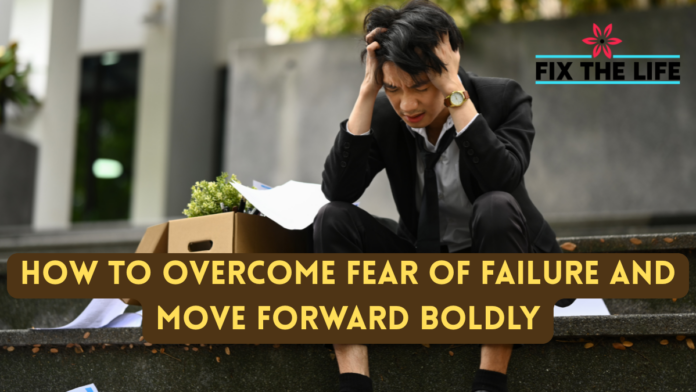Fear of failure is a silent barrier that holds countless people back from reaching their true potential. Whether it’s starting a new business, switching careers, or simply speaking up in a meeting, the anxiety of not succeeding often causes hesitation or complete paralysis.
Understanding how to overcome fear of failure is essential for anyone looking to live courageously and pursue their goals with confidence. The good news? Fear is not your enemy—it’s a signal. With the right mindset and strategies, you can shift from fear-driven avoidance to bold, forward-moving action.
What Is Fear of Failure and Why Does It Hold Us Back?
Fear of failure (also known as atychiphobia) is the emotional reaction to the possibility of not meeting expectations—whether others’ or your own. It often stems from past experiences, societal pressure, or perfectionism.
This fear can result in:
- Procrastination
- Self-sabotage
- Avoiding new opportunities
- Low self-esteem
The problem isn’t failure itself, but what we believe failure says about us. By redefining failure, you can begin the path to transformation.
Reframe Failure as a Learning Opportunity
The first step in fear management is changing how you view failure. Rather than seeing it as a negative endpoint, think of failure as a stepping stone to growth. Every setback is a lesson wrapped in disguise.
Example: Thomas Edison famously said, “I have not failed. I’ve just found 10,000 ways that won’t work.” That mindset helped him keep going until he succeeded.
Personal success mindset tip: Track your “lessons learned” from every challenge. Over time, you’ll see how failure contributed to your progress.
Challenge Limiting Beliefs
Many fears are built on beliefs we’ve absorbed over time, such as:
- “If I fail, I’ll be judged.”
- “Failure means I’m not good enough.”
- “I have to get everything right the first time.”
These beliefs are often irrational and deeply rooted in fear, not fact.
Action step: Write down your beliefs about failure. Then ask: Is this absolutely true? What would I tell a friend in my situation? Replace fear-based thoughts with supportive ones grounded in possibility.
Set Small, Courageous Goals
One of the best ways to build confidence and reduce fear is to take small, consistent steps outside your comfort zone. Every action you take helps train your brain that failure isn’t fatal—it’s manageable.
Example: If you’re afraid of public speaking, start by sharing your ideas in a small team meeting, then work your way up to larger groups.
As you collect small wins, your courage compounds. You’re no longer stuck in fear—you’re moving through it.
Practice Self-Compassion
Being kind to yourself is critical when facing fear. Self-criticism only intensifies anxiety and keeps you stuck. Self-compassion, on the other hand, creates a safe inner environment that allows you to take risks and grow.
Fear management tip: When things don’t go as planned, talk to yourself like you would to a close friend. Encourage, don’t condemn.
Example: “It’s okay. I tried, and I learned something valuable. I’ll do better next time.”
Surround Yourself with Supportive People
You don’t have to face your fears alone. Seek out mentors, coaches, friends, or communities who inspire action, share wisdom, and encourage risk-taking.
Being around people who embrace growth and resilience helps normalize mistakes and build a personal success mindset that’s rooted in progress—not perfection.
Visualize Success
The mind is a powerful tool. By vividly imagining yourself succeeding, you create neural pathways that make that vision feel more achievable.
Exercise: Close your eyes and imagine your ideal outcome. Feel the emotions of success—pride, joy, excitement. Do this regularly to build confidence and readiness.
Final Thoughts
Learning how to overcome fear of failure is a journey, not a one-time fix. But with intentional practice—reframing thoughts, taking small actions, building a strong mindset, and showing yourself compassion—you can break free from the chains of fear.
When you stop letting fear dictate your decisions, you reclaim your power. You don’t wait for the perfect moment—you create it. Bold moves may still come with fear, but now you walk through it with confidence, clarity, and courage.
FAQs
1. Why do I fear failure so much?
Fear of failure often stems from childhood experiences, societal expectations, or personal perfectionism. It’s your brain’s way of protecting you from perceived pain or judgment—but it can be overcome with mindset shifts and practice.
2. How can I tell if my fear of failure is holding me back?
If you find yourself procrastinating, avoiding opportunities, or feeling stuck despite your goals, fear of failure could be the root cause. It often hides behind excuses or self-doubt.
3. What is the fastest way to overcome fear of failure?
There is no “instant” fix, but starting with small, manageable actions and celebrating progress can build momentum. Pair this with mindset work and support from others for faster transformation.
4. Can failure ever be a good thing?
Absolutely! Failure teaches resilience, reveals blind spots, and provides invaluable lessons. Many successful people credit their biggest breakthroughs to previous failures.
5. How do I maintain confidence when I fail?
Practice self-compassion, reflect on what you’ve learned, and remind yourself that failure is temporary—not a reflection of your worth. Use each experience as fuel for growth.




